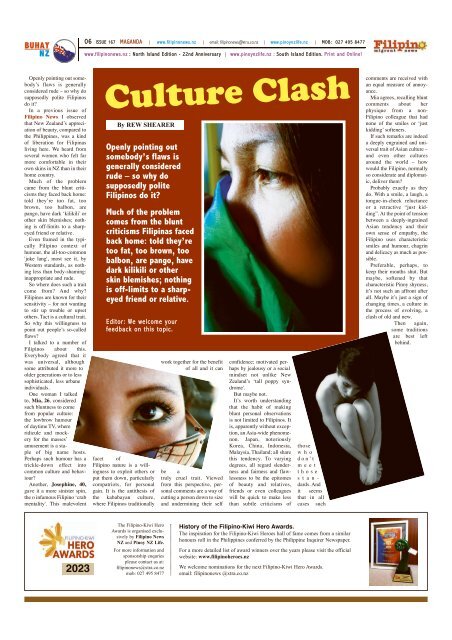Filipino News 167
www.filipinonews.nz : New Zealand's ONLY Filipino Community Newspaper for the last 22 years! email: filipinonews@xtra.co.nz; www.filipinonews.nz; FB: Filipino News NZ
www.filipinonews.nz : New Zealand's ONLY Filipino Community Newspaper for the last 22 years! email: filipinonews@xtra.co.nz; www.filipinonews.nz; FB: Filipino News NZ
Create successful ePaper yourself
Turn your PDF publications into a flip-book with our unique Google optimized e-Paper software.
BUHAY<br />
NZ<br />
06 ISSUE <strong>167</strong> MAGANDA | www.filipinonews.nz | email: filipinonews@xtra.co.nz | www.pinoynzlife.nz | MOB: 027 495 8477<br />
www.filipinonews.nz : North Island Edition - 22nd Anniversary | www.pinoynzlife.nz : South Island Edition. Print and Online!<br />
Openly pointing out somebody’s<br />
flaws is generally<br />
considered rude – so why do<br />
supposedly polite <strong>Filipino</strong>s<br />
do it?<br />
In a previous issue of<br />
<strong>Filipino</strong> <strong>News</strong> I observed<br />
that New Zealand’s appreciation<br />
of beauty, compared to<br />
the Philippines, was a kind<br />
of liberation for Filipinas<br />
living here. We heard from<br />
several women who felt far<br />
more comfortable in their<br />
own skins in NZ than in their<br />
home country.<br />
Much of the problem<br />
came from the blunt criticisms<br />
they faced back home:<br />
told they’re too fat, too<br />
brown, too balbon, are<br />
pango, have dark ‘kilikili’ or<br />
other skin blemishes; nothing<br />
is off-limits to a sharpeyed<br />
friend or relative.<br />
Even framed in the typically<br />
<strong>Filipino</strong> context of<br />
humour, the all-too-common<br />
'joke lang', most see it, by<br />
Western standards, as nothing<br />
less than body-shaming:<br />
inappropriate and rude.<br />
So where does such a trait<br />
come from? And why?<br />
<strong>Filipino</strong>s are known for their<br />
sensitivity – for not wanting<br />
to stir up trouble or upset<br />
others. Tact is a cultural trait.<br />
So why this willingness to<br />
point out people’s so-called<br />
flaws?<br />
I talked to a number of<br />
<strong>Filipino</strong>s about this.<br />
Everybody agreed that it<br />
was universal, although<br />
some attributed it more to<br />
older generations or to less<br />
sophisticated, less urbane<br />
individuals.<br />
One woman I talked<br />
to, Mia, 26, considered<br />
such bluntness to come<br />
from popular culture:<br />
the lowbrow humour<br />
of daytime TV, where<br />
ridicule and mockery<br />
for the masses’<br />
amusement is a staple<br />
of big name hosts.<br />
Perhaps such humour has a<br />
trickle-down effect into<br />
common culture and behaviour?<br />
Another, Josephine, 40,<br />
gave it a more sinister spin,<br />
the o infamous <strong>Filipino</strong> ‘crab<br />
mentality'. This malevolent<br />
Culture Clash<br />
By REW SHEARER<br />
Openly pointing out<br />
somebody’s flaws is<br />
generally considered<br />
rude – so why do<br />
supposedly polite<br />
<strong>Filipino</strong>s do it?<br />
Much of the problem<br />
comes from the blunt<br />
criticisms Filipinas faced<br />
back home: told they’re<br />
too fat, too brown, too<br />
balbon, are pango, have<br />
dark kilikili or other<br />
skin blemishes; nothing<br />
is off-limits to a sharpeyed<br />
friend or relative.<br />
Editor: We welcome your<br />
feedback on this topic.<br />
facet of<br />
<strong>Filipino</strong> nature is a willingness<br />
to exploit others or<br />
put them down, particularly<br />
compatriots, for personal<br />
gain. It is the antithesis of<br />
the kababayan culture,<br />
where <strong>Filipino</strong>s traditionally<br />
work together for the benefit<br />
of all and it can<br />
be a<br />
truly cruel trait. Viewed<br />
from this perspective, personal<br />
comments are a way of<br />
cutting a person down to size<br />
and undermining their self<br />
confidence; motivated perhaps<br />
by jealousy or a social<br />
mindset not unlike New<br />
Zealand’s ‘tall poppy syndrome'.<br />
But maybe not.<br />
It’s worth understanding<br />
that the habit of making<br />
blunt personal observations<br />
is not limited to <strong>Filipino</strong>s. It<br />
is, apparently without exception,<br />
an Asia-wide phenomenon.<br />
Japan, notoriously<br />
Korea, China, Indonesia,<br />
Malaysia, Thailand; all share<br />
this tendency. To varying<br />
degrees, all regard slenderness<br />
and fairness and flawlessness<br />
to be the epitomes<br />
of beauty and relatives,<br />
friends or even colleagues<br />
will be quick to make less<br />
than subtle criticisms of<br />
those<br />
who<br />
don’t<br />
meet<br />
those<br />
s t a n -<br />
dards. And<br />
it seems<br />
that in all<br />
cases such<br />
comments are received with<br />
an equal measure of annoyance.<br />
Mia agrees, recalling blunt<br />
comments about her<br />
physique from a non-<br />
<strong>Filipino</strong> colleague that had<br />
none of the smiles or ‘just<br />
kidding’ softeners.<br />
If such remarks are indeed<br />
a deeply engrained and universal<br />
trait of Asian culture –<br />
and even other cultures<br />
around the world – how<br />
would the <strong>Filipino</strong>, normally<br />
so considerate and diplomatic,<br />
deliver them?<br />
Probably exactly as they<br />
do. With a smile, a laugh, a<br />
tongue-in-cheek reluctance<br />
or a retractive “just kidding”.<br />
At the point of tension<br />
between a deeply-ingrained<br />
Asian tendency and their<br />
own sense of empathy, the<br />
<strong>Filipino</strong> uses characteristic<br />
smiles and humour, chagrin<br />
and delicacy as much as possible.<br />
Preferable, perhaps, to<br />
keep their mouths shut. But<br />
maybe, softened by that<br />
characteristic Pinoy shyness,<br />
it’s not such an affront after<br />
all. Maybe it’s just a sign of<br />
changing times, a culture in<br />
the process of evolving, a<br />
clash of old and new.<br />
Then again,<br />
some traditions<br />
are best left<br />
behind.<br />
2023<br />
The <strong>Filipino</strong>-Kiwi Hero<br />
Awards is organised exclusively<br />
by <strong>Filipino</strong> <strong>News</strong><br />
NZ and Pinoy NZ Life.<br />
For more information and<br />
sponsorship enquries<br />
please contact us at:<br />
filipinonews@xtra.co.nz<br />
mob: 027 495 8477<br />
History of the <strong>Filipino</strong>-Kiwi Hero Awards.<br />
The inspiration for the <strong>Filipino</strong>-Kiwi Heroes hall of fame comes from a similar<br />
honours roll in the Philippines conferred by the Philippine Inquirer <strong>News</strong>paper.<br />
For a more detailed list of award winners over the years please visit the official<br />
website: www.filipinoheroes.nz<br />
We welcome nominations for the next <strong>Filipino</strong>-Kiwi Hero Awards.<br />
email: filipinonews @xtra.co.nz
















